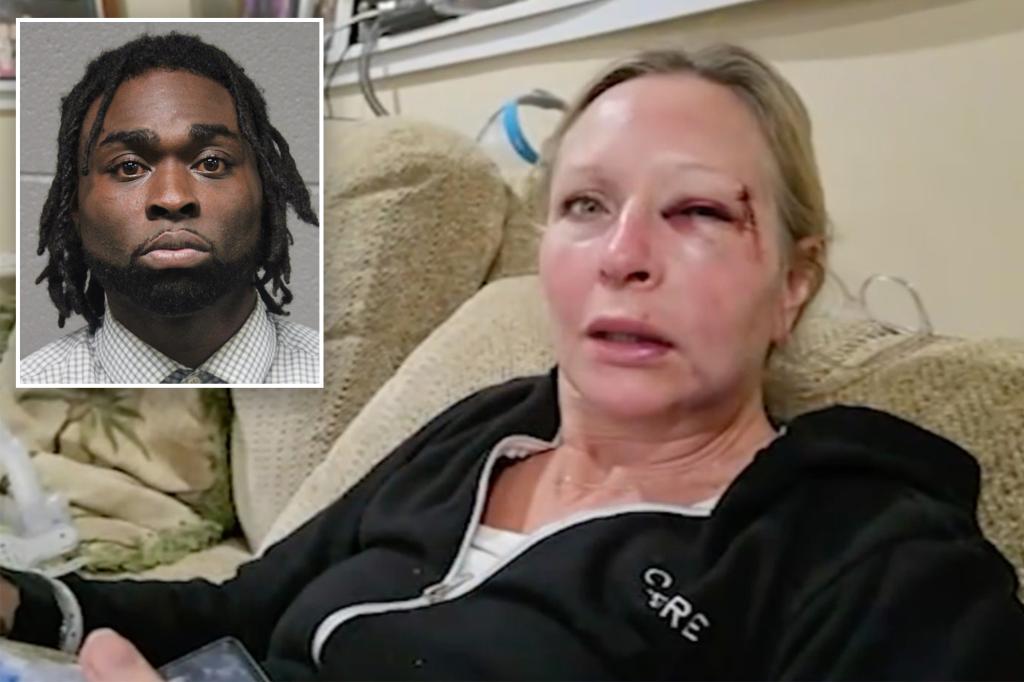Suburban Chicago Mother Falls Victim to Random Attack Amid Rising Urban Violence
In a disturbing incident highlighting Chicago’s ongoing crime crisis, suburban mother Kathleen Miles suffered a brutal unprovoked attack while walking near Union Station in downtown Chicago. The August 19th assault left her with multiple facial fractures, a black eye, and a concussion. Miles, a Lake Villa resident who commutes to the city just once weekly, was allegedly attacked by William Livingston, a man with an extensive criminal history including at least 12 prior arrests for battery or aggravated assault since 2012. The incident has gained national attention as President Trump has announced plans to deploy the National Guard to address Chicago’s escalating crime problems.
The attack occurred suddenly as Miles walked with a coworker. According to her colleague’s account, Livingston reportedly wedged himself between the two women before becoming violent. “She had said, ‘This man came in between the two of us, shoved us apart, and then hit me in the face,'” Miles recalled her coworker explaining. The assault was so severe that Miles has no personal memory of the incident. Her first recollection after the attack was regaining consciousness in a hospital bed with her coworker standing over her, saying, “You’re OK. You’re in the hospital. You’ve been assaulted.” Miles then lost consciousness again, later awakening to find her daughter Deanna at her bedside reassuring her, “Hi, Mama, I’m here. You’re OK.”
Following the attack, authorities arrested 32-year-old William Livingston, charging him with three counts of aggravated battery causing great bodily harm and reckless conduct. Investigation into Livingston’s background revealed a troubling pattern of violent behavior—he has reportedly been arrested 17 times since 2014, with most charges involving battery and aggravated assaults against women and law enforcement officers. This pattern of repeat offenses has become a focal point in discussions about Chicago’s approach to criminal justice. Miles herself expressed frustration with the system that allowed Livingston to remain on the streets despite his extensive criminal history, stating, “It’s 2025, and he’s out. And if he had been held accountable for his actions, then I wouldn’t be sitting here with injuries.”
The attack on Miles comes amid broader concerns about public safety in Chicago, which continues to experience high levels of violent crime. The city’s recent Labor Day weekend was particularly violent, with reports indicating 58 people were shot and eight killed. These statistics represent more than just numbers—they reflect a community where residents increasingly feel unsafe going about their daily activities. Miles’s case is particularly concerning because it appears to be completely random, suggesting that anyone could become a victim while simply walking in downtown Chicago, even during daylight hours in typically busy areas like those near Union Station.
In response to the ongoing violence, President Trump has announced his intention to deploy the National Guard to Chicago, similar to federal interventions previously implemented in Washington, D.C. During an Oval Office meeting, the 79-year-old president confirmed plans to send federal troops but did not specify a timeline, simply stating, “We’re going in,” and adding, “I didn’t say when.” Trump indicated he would prefer cooperation from state leadership, saying, “If the governor of Illinois would call up, call me up, I would love to do it,” referring to Governor JB Pritzker, before adding, “Now, we’re going to do it anyway. We have the right to do it.” This announcement has sparked debate about federal intervention in local law enforcement matters and the appropriate responses to urban crime.
The case of Kathleen Miles illustrates the human cost of urban violence and raises important questions about criminal justice policies in Chicago and other major cities. As Miles recovers from her injuries, her story has become emblematic of broader societal concerns about public safety, repeat offenders, and the effectiveness of current approaches to crime prevention and punishment. The incident highlights the tension between various criminal justice reform efforts and the need to protect innocent citizens from harm. While political leaders debate policy solutions, everyday residents like Miles and her family deal with the real and devastating consequences of violent crime—consequences that extend far beyond physical injuries to include psychological trauma and a diminished sense of security in public spaces. As Chicago and other cities grapple with these challenges, finding the right balance between reform and public safety remains an urgent priority.


